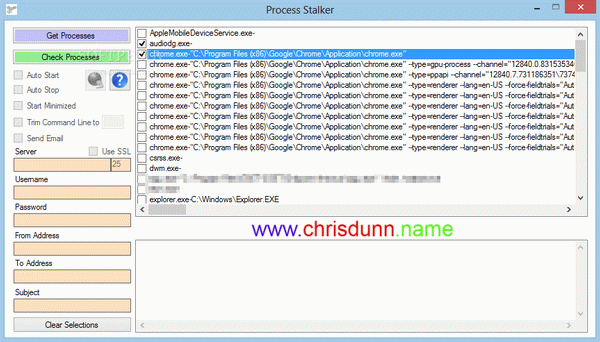Every running program or video game leaves creates an active background process for in-depth analysis. It also comes in handy for analyzing resource consumption, or to forcefully close it if the target app is not responding. In this regard, Process Stalker can be set to keep an eye on one, or more processes, and notify you when changes occur.
Before you can start stalking processes, like the name suggests, you need to check whether or not .NET Framework is on your computer. With this requirement out of the way, there’s nothing else to stop you from running the application, especially since there’s no setup involved. This means it can also be carried around on a thumb drive.
On the visual side, the structure is well-organized, with a large list of processes which gets updated at the press of a button. Sadly, there are no filters to apply, not even a search field for quick identification. A different section is where all notifications end up, while general configuration options are found in a side panel.
Once processes are displayed, you need to select those you wish to monitor. It’s best to cease all other activities in the meantime. By default, process check needs to be manually performed, but a dedicated function can be enabled to have this automatically done, because checking is the only way to tell if, and when something is wrong.
Additional options include logging to a CSV file created in the source folder, show alerts on the desktop, or automatically start with Windows, but process selection needs to be done at every startup. Moreover, alerts can be received via email by simply filling in server, subject, and account credentials.
Bottom line is that Process Stalker is a powerful process monitor, which aims to let you know if something happened to an important task. It’s also handy for tracking down suspicious processes, while report delivery is automated through email configurations, to receive real-time updates on the process status.

Cristian
Thank you for the crack for Process Stalker
Reply
chiara
Yippee! thanks for the keygen
Reply
Luisa
thanks for the patch for Process Stalker
Reply